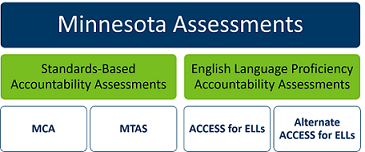Statewide Assessments
Minnesota's statewide assessments support an equitable education system for all students.
The assessment results provide a window into equitable opportunities for students across the state to demonstrate:
- Learning of the Minnesota Academic Standards (MCA and MTAS/Alt MCA).
- Progress towards proficiency of WIDA English Language Development Standards (WIDA ACCESS and WIDA Alternate ACCESS).
MCA and MTAS/Alt MCA results represent a snapshot of student learning of grade-level content standards.
The results represent a valid measurement of student learning of the academic standards at the time they test. However, these results alone do not illustrate the whole picture of what a student has learned that school year.
WIDA ACCESS and WIDA Alt ACCESS results represent the level of proficiency in academic English, at the time that students test.
Statewide assessment results should be used with additional evidence of student learning.
Minnesota's statewide assessments function as one part of a balanced, comprehensive assessment system that works in coordination to provide information about student learning of the standards. The results should be considered with additional, more fine-grained evidence of student learning, like projects and classroom assessments.
MCA and MTAS/Alt MCA Overview
The federal Every Student Succeeds Act (ESSA) and Minnesota statutes require that public school students be assessed annually in reading, mathematics, and science. The MCA and MTAS/Alt MCA are the standards-based accountability assessments used to meet this requirement. They are developed and revised in collaboration with Minnesota educators, as outlined at the bottom of this page.
The results provide a window into equitable student learning opportunities across the state. This allows policymakers, school leaders, and the public to gain general insight into the extent students have access to rigorous standards-based content and instruction at their school and district. These results provide one data point that should be considered in the context of additional evidence of student learning, such a student projects and assignments, and other data from the district’s comprehensive and balanced assessment system.
Who takes the MCA versus the MTAS/Alt MCA?
Most students take the Minnesota Comprehensive Assessment (MCA). Students with significant cognitive disabilities who receive special education services and meet specific eligibility requirements may take the Minnesota Test of Academic Skills (MTAS) or Alternate Minnesota Comprehensive Assessment (Alt MCA) in place of the MCA.
Does the MCA assess students on the newly revised academic standards?
The MCA and MTAS/Alt MCA are criterion-referenced assessments, which means they measure a snapshot of student learning of a fixed set of criteria: the Minnesota Academic Standards. The Minnesota K–12 Academic Standards are revised every 10 years, according to a schedule determined by the state legislature. When standards are updated, the statewide assessments are also updated with a new series to align to the new standards. The new assessments are administered when the new academic standards are fully implemented.
The table below outlines Minnesota’s standard-based accountability assessments, and which standards they are aligned to.
| Subject | Grade Level Assessment | Standards Assessed on MCA-III | First Year MCA-IV Administered | Standards Assessed on MCA-IV |
|---|---|---|---|---|
| Reading | 3–8, and 10 | Minnesota K–12 Academic Standards in English Language Arts (2010). Last administration of the Reading MCA-III is spring 2025. | 2025–26 | 2020 Minnesota K–12 Academic Standards in English Language Arts |
| Mathematics | 3–8, and 11 | Minnesota K–12 Academic Standards in Mathematics (2007).
| 2027–28 | 2022 Minnesota K–12 Academic Standards in Mathematics |
| Science | 5, 8, and once in high school (when completing credit for Life Science/Biology) | Last administration of the Science MCA-III was spring 2024. | 2024–25 | 2019 Minnesota K–12 Academic Standards in Science |
Note: The MTAS will be replaced with the Alt MCA, following the same transition plan listed above for the different subjects (science in spring 2025, reading in spring 2026, and mathematics in spring 2028).
WIDA ACCESS and WIDA Alternate ACCESS Overview
In addition to the standards-based accountability assessments, ESSA and Minnesota statutes require all English learners (ELs) be assessed in grades K–12 in English language proficiency. WIDA ACCESS and WIDA Alternate ACCESS are used to meet this federal requirement. These assessments are developed by the multi-state WIDA Consortium.
Who takes the WIDA ACCESS versus the WIDA Alternate ACCESS?
Most EL students take the WIDA ACCESS, but EL students with significant cognitive disabilities who receive special education services and meet the participation criteria may take the WIDA Alternate ACCESS. The primary purpose of the English language proficiency accountability assessments is to measure progress towards meeting the WIDA English Language Development Standards. For more information about WIDA ACCESS and WIDA Alternate ACCESS, please visit WIDA's website.
Test Development
The summarizes the continuous process used for developing the MCA and MTAS/Alt MCA. Committees of educators and community members are involved in each step and work to ensure all test content is culturally affirming and represents the rich diversity of Minnesota students.


